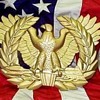Posted 13 years ago
 Chrisnp
Chrisnp
(310 items)
For the French, eligibility for the Victory Medal (Pictures 1 & 2, Left) was quite involved, but essentially it was reserved for military personnel who served in combat for three months, as well as several special categories: nurses, prisoners of war, German defectors who later joined the French, etc.
These companion medals are usually seen worn beside the Victory Medal:
The Medaille Commemorative Francaise 1914-1918 (French Commemorative medal of 1914-1918) is at the center of pictures 1 and 2. It was awarded to all personnel who served in WWI. In addition to all military, it was awarded to the Merchant Navy, civilian medical personnel, local authorities, and police and firemen who responded to shelling of cities, etc.
The Croix du Combattant (Combatant's Cross) is at the right in pictures 1 and 2. This cross was awarded to all military personnel who fought on the front. Holders of this medal were entitled to assistance from the French National Office for Combatants. Those who served again as a combatant in WWII wore two bars on the ribbon "1914-1918" and "1939-1945".
Picture 4 is my favorite example of someone wearing the French Victory Medal and the Commemorative Medal of 1914-18 beside his Legion of Honor.
Further information on the French Victory medal is at http://www.collectorsweekly.com/stories/36149-the-wwi-victory-medal-series-france















Very beautiful medals and medals ensemble! Very interesting account. No surprises there. However, I was surprised to see villain Capt. Louis Renault featured in Photo 4, and under the banner of your "favorite example of someone wearing the French Victory Medal and the Commemorative Medal of 1914-18 beside his Legion of Honor". "Casablanca" is one of my favorite movies, and here's one of my favorite Capt. Renault quips.
(The following exchange takes place in context of Capt. Renault's praise of Richard Blaine, "Rick", portrayed by Humphrey Bogart.)
Gestapo Major Strasser: You give him credit for too much cleverness. My impression was that he's just another blundering American.
Captain Renault: We mustn’t underestimate "American blundering". I was with them when they "blundered" into Berlin in 1918.
Thanks MiKKo. Based on Capt. Renault’s decorations, he could have seen them “March through Berlin” in 1918. For such a great line I’m willing to forget for a moment that he war ended in an armistice as the Americans were still crossing the Meuse River. Although an unrepentant womanizer, Renault does seem to find his honor again at the end of the movie, when he conceals Rick’s killing of Major Strasser, and we see them walking away together to go join a Free French Garrison in the closing scene.
Thank you, sir! Re the Armistice, I should know better than to quarrel with a scholar. : )